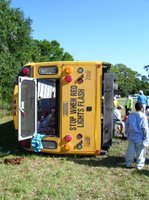
Last month’s topic at my CI support group was emergency medical issues and cochlear implants. We discussed medical identification jewelry, the training (or lack of) that's given to local hospital ER personnel concerning how to deal with hearing impaired patients, and other issues related to safety. So when a notice was posted on our community bulletin board, “Volunteers needed to act as victims in a county-wide disaster simulation exercise”, Gerry and I signed up. Here’s my chance, I thought, to witness firsthand how a deaf person is treated during a large-scale emergency medical crisis.
The scenario was a terrorist-incited explosion which resulted in an accident involving a bus and an ambulance. A group of us with all manner of realistic mock injuries were stationed inside the bus. Gerry was "assigned" a broken femur bone (left leg) and I was to be mentally altered, confused and disoriented but otherwise unharmed. I wore my medical ID necklace over my torn and stained T-shirt.
With a healthy mixture of excitement and trepidation, I pocketed my BTE as soon as the sound of sirens signaled their eminent approach. Obviously, my world went silent and the experiment commenced. About 4 hours later, after being triaged to a yellow tarp in the field, transported to a local hospital, and processed for treatment, the drill was over. I eagerly re-connected my BTE to my internal implant and, voila, the glorious sounds of the real world were suddenly mine again!
What did I learn from this unusual experience? For what it’s worth, here are my observations:
1. The policemen and firefighters were not interested in reading my medical ID. Perhaps they ignored my frantic cries of “I’ve lost my implant. I can’t hear!” and my waving my medical ID pendant for their inspection because they knew me to be “out-of-it”.
2. The assumption made by all rescue personnel assigned to me, both in the field and at the hospital, was that I knew sign language. It was even recorded on one of my hospital forms. Do they not know that most late-deafened adults grew up in the hearing world and never learned sign language? ASL is only useful if the other party also “speaks the same language”!
3. No one thought to write down the questions they were asking me or to point to the questions on the form. Apparently being deaf means that you are also illiterate!
4. I felt very vulnerable and totally dependent on my powers of observation, acutely aware of the reality of the fact that this simulated exercise would have been my real world experience if not for the miracle of CI technology. Thank God for my bionic ear!
5. Being functional deaf is as exhausting as I remembered it to be. When we arrived home, I took two aspirins and headed for the couch.
Wednesday, May 03, 2006
A Disaster Simulation
Subscribe to:
Posts (Atom)


